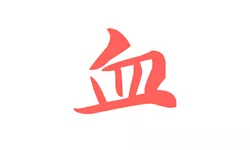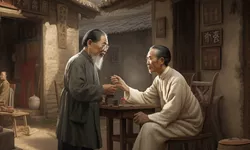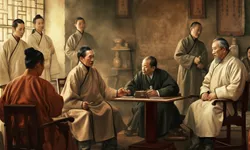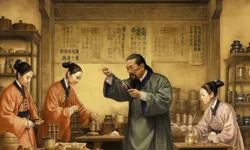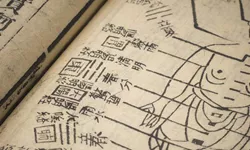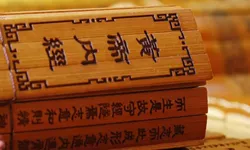The concept of Qi (pronounced "tchee") is fundamental in the Chinese Medicine explanation of the world. Qi is often translated as "energy" or "vital essence" but it is much more than that. Qi the fundamental substance that enables all things in the universe to exist and to constantly change. The Chinese character for Qi is 气, the same character used for air or gaz. This shows that it is thought to have a similar consistance and similar properties as air: invisible yet everywhere.
Chinese Medicine believes that Qi is one of the basic constitutive materials of the human body and that it maintains its vital activities. Without Qi, no life is possible. Everything in the human body is constituted of Qi: the body organs, body fluids, blood, etc. It is often compared to the Western medicine concept of ATP, the molecules that store and transport chemical energy within cells. It is however somewhat different because it is also used to refer to the physiological functions of organs or other body parts. Kidney Qi will for instance have a different role than Heart Qi.
Nomenclature of Qi

Qi has different names depending on its sources, roles, and locations. When you look at sources, there is a distinction between Primordial Qi and Qi acquired throughout one's life. Primordial Qi is inherited from our parents. It is made up of an essence called "Jing" (精) and is stored in our Kidneys. After we're born, Qi gets constantly replenished with the so-called "Pectoral Qi" which is itself composed of both "Clean air" and "Grain Qi". Grain Qi refers to the Qi extracted by our Spleen from the food we eat and water we drink. Clean air refers to the air we breathe after it's been filtered by our Lungs. Combined together, Primordial Qi and Pectoral Qi form the so-called "Normal Qi".
Looking at roles, Qi is divided into "Defensive Qi" and "Nutritive Qi". Nutritive Qi flows in parallel with the bloodstream. Its role is to nourish body tissues and to generate Blood. Defensive Qi's role is, like the name implies, to defend the body against "evil" invasions. As such it is present in all places of the body that are susceptible to sustain such invasions. This means the skin, the outside of organs, around the muscles and so on and so forth.
Lastly, Qi can be further classified based on the organ or meridian where it resides. Qi is a core constituent of each Organ and it is tasked with maintaining its normal function. It is present in all Zang-Fu organs and it is named after the organ where it resides: "Liver Qi", "Spleen Qi", etc. The Qi that resides in meridians is also tasked with maintaining their normal function. Each one of the "Twelve normal meridians" and "Eight extraordinary meridians" has it own Qi. Qi in both the organs and the meridians is always derived from "Pectoral Qi". It gets continuously replenished throughout one's life.
Roles of Qi
In the context of Chinese Medicine Qi fulfills five main roles:
- A "promotion" role: a bit like soil promotes the development of plants, Qi promotes the essential functions of organs and meridians in the human body. That's why Chinese Medicine texts often refer to it as the "root of life". It's important to note that this promotion role behaves differently based on where Qi resides. For instance "Lung Qi" promotes respiration and regulates water passage while "Kidney Qi" will promote growth and development of the body as well as reproduction.
- A "warming" role: Qi is tasked with warming the body and it is in general the source of any heat in the body. That's because of this warming role that Qi is believed to be Yang in nature.
- A "defensive" role: Qi has the role of defending the human body against invasions such as pathogens or one of the so-called "Six Evils" (Wind, Cold, Summer Heat, Dampness, Dryness)
- A "fixating" role: this means that Qi prevents liquid substances such as blood or body fluids from leaking beyond normal physiological behavior. Concretely this means that Qi will for instance "fixate" blood inside the veins or control the amount of secretion of other fluids like saliva, sweat or urine.
- A "transforming" role: this refers to the metabolism of substances in the body that are caused by Qi. For instance via the action of Qi water will be transformed into sweat and urine. Similarly Qi induces the metabolism of other substances like blood, semen or even itself, Qi.
Pathological manifestations of Qi issues
There are various manifestations of Qi-related issues. In general, it can be divided into "Qi deficiency", "Qi collapse", "Qi blockage" and "Qi reversal".
Qi deficiency simply means lack of Qi. It includes the lack of Primordial Qi, Nutritive Qi, Defensive Qi or the Qi that resides in organs or meridians. It mainly manifests itself in a weakened function of organs and a declining ability of the body to resist diseases. Clinical symptoms include shortness of breath, fatigue, pale tongue, weak pulse, etc. The treatment method should be to supply Qi via a change of diet or specialized Chinese herbs.
A "Qi collapse" is when the power of Qi to keep organs in place is weakened due to lack of Qi. The clearest sign of a Qi collapse is that one's organs will tend to sunk in the body. Clinical manifestations include abdominal distention or rectal or uterine prolapse accompanied by symptoms of Qi deficiency. A "Qi collapse" is most often due to a lack of Spleen Qi and treatment consists in supplying Qi in order to "lift what sank".
"Qi blockage" refers to Qi stagnation in one's body. This results in impaired functions of the organs and clinical manifestations include severe and painful swelling, chest tightness or abdominal distension. To treat a Qi blockage one should use Chinese Medicine methods that promote smooth flow of Qi such as specialized massages or Chinese herbal medicine.
"Qi reversal" means that the "Pectoral Qi" doesn't go down in the body anymore. This results in symptoms such as excessive coughing, hiccups or vomiting. In short signs that things are ascending in your body rather than descending. The treatment principle should be to use methods to push Qi down in your body.
Sources:
Ted J. Kaptchuk (1983). The Web That Has No Weaver: Understanding Chinese Medicine. Chicago, Il., U.S.A.: Congdon & Weed.
Ko, Robert. Health Concepts in Chinese Medicine [PDF documents and videos]. Retrieved from The Hong Kong University of Science and Technology on Coursera: https://www.coursera.org/learn/health-concepts-chinese-medicine
Qi. (n.d.). In Wikipedia. Retrieved April 24, 2018, from https://en.wikipedia.org/wiki/Qi
气. (n.d.). In A+医学百科. Retrieved April 24, 2018, from http://www.a-hospital.com/w/%E6%B0%94
气 (中医术语). (n.d.). In Baidu Baike. Retrieved April 24, 2018, from https://baike.baidu.com/item/%E6%B0%94/10603498#viewPageContent
Article tags: Chinese Medicine theory

